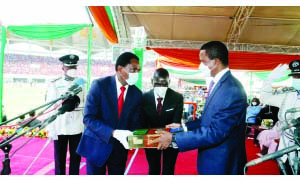
By JOWIT SALUSEKI –
The fact that Zambia is a shining example of democracy on the African continent cannot be refuted.
Evidence to that effect abounds.
For instance, despite the bitterly contested August 11, 2021 elections that pitted Edgar Lungu of the Patriotic Front (PF) against his then main rival Hakainde Hichilema of the United Party for National Development (UPND), what followed was a smooth transfer of power.
Yes, there was some mediation in the background by eminent personalities, including ex-heads of State for Mr Lungu to concede defeat to his one time nemesis, Mr Hichilema.
Smooth power transfers from one president to another through democratic elections have been observed from Kenneth Kaunda in the UNIP era to date.
Dr Kaunda handed over power to Movement for Multiparty Democracy’s Frederick Chiluba in 1991 , who also did the same to Levy Mwanawasa in 2001.
When Mr Mwanasawa died in office, he was succeeded by his vice Rupiah Banda in 2008.
Mr Banda after being defeated in a 2011 later handed over the instruments of power to Michael Sata of the Patriotic Front in 2011.
After his untimely death while in office, Mr Sata was succeeded by Mr Edgar Lungu after a hotly contested presidential by-elections which resulted in Mr Lungu being sworn in on January 25, 2015.
Following the wind of change that preceded the 2021 polls, Mr Lungu was resoundingly defeated in the August 11 elections and was succeeded by Mr Hichilema on August 24, 2021.
In December of the same year, President Hichilema noted that Zambia was a shining example of democracy.
President Hichilema noted that the country’ status in that aspect continues to increase as it was revived in the August 12, 2021 general elections.
The Head of State said Zambia in 2021 saw a democratic revival and that the leading actors were the citizens of all ages and tribes.
Prior to that, on September 22, 2015, then United States (US) Ambassador to Zambia Eric Schultz also observed that Zambia remained a shining example of democracy in Africa.
Mr Schultz noted then that when one looked around the continent, there were few countries that matched Zambia’s democratic credentials as seen in the routine smooth handover of power.
He said the country needed to consolidate its democratic credentials by strengthening its governance institutions.
Mr Schultz observed that the country had remained peaceful amidst several challenges.
He commended the country for its rich cultures as well as for being peaceful.
Similarly, on June 7, 2017, then visiting President of Madagascar Hery Rajaonarimampianina commended Zambia for its political stability and urged the country’s leadership to take a leading role in ensuring that peaceful elections took place in the neighbouring Democratic Republic of Congo (DRC).
Mr Rajaonarimampianina said he believed that democracy was and is still alive in Zambia.
“My wish is that the democracy enjoyed here can be emulated by other countries as we continue to learn from you,” he said in an interview with journalists in Lusaka.
Mr Rajaonarimampianina noted that development cannot take place anywhere if peace and stability are not exhibited.
It is against this background that from March 29 -30, 2023, Zambia will co-host the second Summit for Democracy (S4D2) with the USA , Costa Rica, Netherlands, and the Republic of Korea.
The main purpose of this Summit is to underscore the global desire for transparent, accountable and rights-respecting governance.
It is worth stating that the first S4D1 was held in December 2021, and was hosted by theUSA.
The December 2021 Summit kicked off a year of action by participants to make democracies more responsive and resilient, and to build a broader community of partners committed to global democratic renewal.
The March 2023 S4D2 will bring together leaders from governments, civil society, and the private sector to demonstrate how democracies deliver for their citizens and highlight democracies’ resolve to address the world’s most pressing challenges.
Apart from US Vice President Kamala Harris who will attend the Lusaka Summit physically together with her husband Douglas Emhoff, world leaders from the co-host nations will assemble in a virtual leader-level plenary.
This will be followed by a series of gatherings with representatives from governments, civil society, and the private sector in each co-hosted location.
Mr Hichilema, will co-host the second Summit S4D2 for the African Region.
The Summit objectives will promulgate S4D2’s key themes of democracies delivering tangible benefits to citizens; and the need for collective action that responds to the greatest challenges of our time.
The other objective will be to showcase progress made by world leaders on commitments made at S4D1 and during the Year of Action.
Zambia, as co-host, looks forward to partners in democracy coming together at the Second Summit to discuss strides made in the promotion of democracy.
The Summit will also discuss challenges encountered and how these challenges can be overcome.
Participating countries will report progress in implementing the commitments made at the first Summit.
Further, the Summit will support a meaningful declaration of our collective priorities that address the challenges of our time, and to recommit to strengthening democratic resilience globally.
Zambia will host 16 other African States under the theme, “Free, Fair and Transparent Elections in Africa”.
In attendance will be Angola, Botswana, Cape Verde, DR Congo, Ghana, Kenya, Liberia, Malawi, Mauritius, Namibia, Niger, Nigeria, Sao Tome and Principe, Senegal, Seychelles, and South Africa.
Free, fair and transparent elections are a common theme that heralds good governance, economic growth and effective bilateral trade.
Zambia’s selection as host for the African Region of the Summit also comes against the backdrop of the country’s strong commitment to the principles of democratic governance, respect for the rule of law, and individual freedoms under the leadership of President Hichilema.
Other co-hosts Costa Rica, the Netherlands, the Republic of Korea, were invited based on leadership in the Year of Action and more broadly on democratic renewal and human rights, both regionally and globally.
The New Dawn administration has sought to strengthen democratic institutions and the rule of law.
After many years of neglect and a shrinking democratic space, Zambia’s role as co-host will be a visible demonstration to the other 16 African nations invited — as well as others around the continent — of the democratic dividend in action.
With President Hichilema and Vice-President Harris standing side by side to speak with democracy advocates, leaders of civil society and media from across the continent, Zambia’s co-hosted event will highlight the unbreakable partnership between all democracies.







